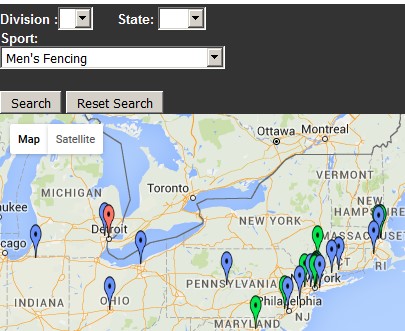March Madness just ended – no, not the March Madness you are thinking of, but rather the 2016 NCAA Fencing Championships were just held at Brandeis University in Waltham, MA, near Boston. Each year the top fencers from NCAA fencing teams around the US come together for team and individual bragging rights. This year there were 144 fencers representing 25 colleges and universities at the NCAA Championships. For the second year in a row, Columbia won the team championship, followed very closely by Ohio State, Princeton, St. John’s, and Notre Dame.

There are currently 44 US colleges and universities with NCAA fencing teams, although a few of these only have a women’s team. While you probably recognize all of the above schools in the top 5, the full list of schools with teams is quite diverse. There are larger public schools like Wayne State (Michigan) and City College of NY (CUNY), STEM-focused schools like MIT, NJIT, and Cal Tech, and smaller liberal arts colleges like Vassar, Drew, and Haverford. The NCAA.org website has an interactive map that shows the location of all member schools.
http://web1.ncaa.org/maps/memberMap.jsp
You can select Men’s Fencing, Women’s Fencing, or Mixed Fencing from the drop list. Below is a map of the Men’s programs in the northeast.

Like other collegiate sports, schools belong to either Division 1, 2, or 3. Unlike many other sports though, fencing teams from different divisions compete against each other at the same competitions and compete together at the National Championships. There were several Div 2 and Div 3 schools represented this year at the NCAA tournament.
The primary differences between NCAA divisions are recruiting and scholarship rules. Div 1 and 2 schools have restrictive recruiting rules that limit how and when coaches can reach out to high school students, but can offer athletic scholarships. Div 3 schools have fewer restrictions, but cannot offer athletic scholarships. However, some Div 3 schools have very strong teams and can beat Div 1 teams in head-to-head competition. Many NCAA fencing schools are highly selective and fencing recruitment can be a hook in the admissions process.
With the excellent fencing program at RFC, there’s a strong possibility of fencing in college for those that want to continue on past high school. In just the past three years, RFC graduates have gone on to fence in NCAA programs at Brown, Cornell, Cleveland State University, Duke, and Ohio State.



